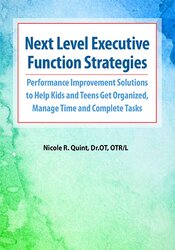

In this experiential program, you will learn evidence-based cognitive, physical and environmental strategies to use in the assessment and intervention of executive function (EF) deficits in children and adolescents.
You will learn effective assessment processes, activity analysis, interventions and coaching activities that empower positive behavior change in the kids you work with. These innovative interventions will help your clients successfully negotiate the daily tasks of life such as organization, time management, initiation and completion of tasks – without heavy reliance on others.
You will learn interventions that increase self-awareness, self-monitoring and problem-solving skills and teach them how to be proactive and a socially and academically successful student. The often-forgotten influence of sleep will also be prioritized as a means to success, along with routine-building strategies, such as goal attainment scaling.
In this recording, you'll learn how to:
Focusing on a top-down, client-centered approach and incorporating both remediative and adaptive interventions ensures that you can hit the ground running with your clients immediately. Your competence will translate to their confidence!
This online program is worth 6.75 hours CPD.
| File type | File name | Number of pages | |
|---|---|---|---|
| Manual - Turning “I Can’t” into “I Can!” for Kids (2.69 MB) | 75 Pages | Available after Purchase |

Nicole R. Quint, Dr.OT, OTR/L, is a licensed occupational therapist with more than 15 years of experience in pediatric practice, specializing in sensory processing, executive functioning skills, behavioral strategies and social emotional learning. Her clinical practice includes work in the hospital, home health, outpatient, and school-based settings. Currently an associate professor at Nova Southeastern University’s Department of Occupational Therapy, Dr. Quint provides instruction in both the masters and doctoral programs since 2009. She provides consulting services specific to advocacy in the schools, organizational conflict assessments, leadership, program development and evaluation, as well as innovative practice development. Her research focus includes adults with sensory processing disorder, autism and vision, and sensory based interventions.
Dr. Quint has developed programs to promote sensory processing as a foundation for learning, social emotional learning and development to promote performance in all areas. She has an expansive presence in local, state and national conference platforms, including Region 7 South Occupational Therapy Group; Florida Occupational Therapy Association (FOTA); American Occupational Therapy Association (AOTA); Section on Pediatrics Annual Conference; Academy of Pediatric Physical Therapy Annual Conference (SoPAC, APPTA); as well as presenting at the Canadian Occupational Therapy Conference in 2018. Dr. Quint provides professional development trainings for continuing education through OccupationalTherapy.com, Arizona Autism, PhysicalTherapy.com, Audiology.com, TheraCare AZ.
Dr. Quint heads the Making Sense of SPD Parent Support Group in Davie, FL, which works toward education, advocacy, and support for families living with SPD. She is the co-creator of It Just Makes Sense, a grant-funded professional development program for the occupational and physical therapists working in Broward County Public Schools, the sixth largest school district in the nation. Dr. Quint is completing her PhD in conflict analysis and resolution, focusing on conflict related to disabilities and systems, including special education, legal systems, and health care.
Speaker Disclosures:
Financial: Nicole Quint maintains a private practice. She is a professor at Nova Southwestern University and an independent contractor with Western Psychological Services. Nicole Quint receives a speaking honorarium, recording royalties, and a consultant fee from PESI, Inc. She has no relevant financial relationships with ineligible organizations.
Non-financial: Nicole Quint is a member of the American Occupational Therapy Association and the Florida Occupational Therapy Association.
| 5 |
|
| 4 |
|
| 3 |
|
| 2 |
|
| 1 |
|
Satisfaction Guarantee
Your satisfaction is our goal and our guarantee. Concerns should be addressed to info@pesi.co.uk or call 01235847393.
Please wait ...